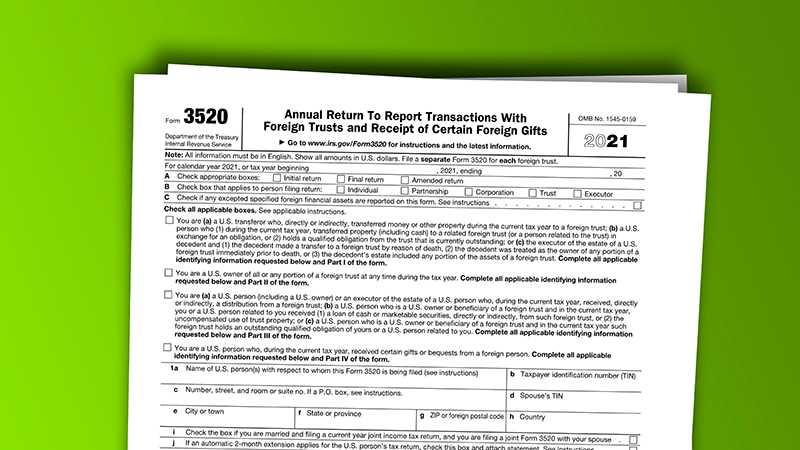Reporting foreign inheritance to IRS: top mistakes to avoid
Wiki Article
The Benefits of Timely Coverage Foreign Inheritance to IRS and Its Effect on Your Funds
Timely reporting of international inheritance to the IRS can significantly influence a person's economic landscape. By comprehending the coverage demands, one can prevent potential penalties and legal complications - penalties for not filing Form 3520. In addition, there are tax advantages related to timely declaring that could improve total monetary planning. The ramifications of these activities can be far-ranging, affecting investment chances and possession management techniques. What remains to be explored are the intricacies of international inheritance regulations and their repercussionsUnderstanding IRS Coverage Requirements for Foreign Inheritance
When individuals receive an inheritance from abroad, they have to navigate particular IRS coverage demands to assure conformity. The IRS requireds that united state locals and residents report foreign inheritances surpassing $100,000 on Kind 3520, which is due on the same date as their tax return. This type catches essential details about the inheritance, including the quantity received and the connection to the decedent. In addition, any foreign financial institution accounts related to the inheritance may need reporting under the Foreign Financial Institution and Financial Accounts (FBAR) regulations if the aggregate value surpasses $10,000. Recognizing these requirements is important, as failing to record can lead to considerable charges. Individuals should remain conscious of any type of appropriate estate taxes that may occur from foreign inheritances, particularly if the estate surpasses specific thresholds. Appropriate adherence to these guidelines guarantees that individuals manage their economic commitments effectively and stay clear of difficulties with the IRS.Staying Clear Of Charges and Legal Issues
Guiding with the complexities of foreign inheritance reporting can be intimidating, but understanding the needs is essential for staying clear of fines and legal problems. The IRS imposes stringent standards on reporting foreign inheritances, and failure to abide can cause serious repercussions. Taxpayers should recognize kinds such as the FinCEN Kind 114 and IRS Type 3520, which serve to divulge international gifts and inheritances accurately.Disobedience can lead to significant fines, and sometimes, criminal fees may be pursued. In addition, unreported inheritances can complicate estate matters, bring about more lawful difficulties. Timely and precise coverage not just alleviates these risks yet likewise cultivates transparency and trust with tax obligation authorities. By prioritizing conformity, individuals can concentrate on managing their newly found assets as opposed to maneuvering possible legal disagreements or charges - reporting foreign inheritance to IRS. Inevitably, comprehending coverage requirements is vital for keeping economic comfort
Potential Tax Benefits of Timely Reporting
The key emphasis of reporting foreign inheritances commonly focuses on compliance, timely coverage can additionally reveal potential tax obligation advantages. By immediately divulging foreign inheritances to the IRS, individuals might have the ability to capitalize on details exceptions and deductions that could reduce their general tax obligation liability. The IRS enables specific foreign estate tax credit scores that reporting foreign inheritance to IRS can counter United state tax obligation commitments. In addition, timely reporting might facilitate making use of the annual present tax obligation exemption, making it possible for recipients to disperse sections of their inheritance to family members or close friends without sustaining added tax obligation obligations.Early reporting can give quality on exactly how the inheritance fits into an individual's total monetary photo, potentially permitting for calculated tax preparation. This positive method minimizes shocks and assists individuals make educated decisions regarding their economic future. Eventually, understanding these possible tax advantages can substantially improve the financial benefits of inheriting international possessions.
Enhancing Financial Planning and Financial Investment Opportunities
Timely coverage of foreign inheritances not just ensures conformity with IRS guidelines but likewise opens up opportunities for enhanced monetary planning and financial investment opportunities. When people disclose their inheritances immediately, they can strategically include these assets right into their overall monetary profiles. This positive strategy allows for much better analysis of net worth and helps with educated decision-making regarding financial investments.
Browsing Complexities of International Inheritance Regulations
Steering via the complexities of worldwide inheritance regulations can be challenging, as differing lawful structures across countries usually result in confusion and issues. Each territory may impose distinct policies regarding the distribution of assets, tax responsibilities, and called for documentation, complicating the procedure for beneficiaries. This intricacy is aggravated by the possibility for conflicting laws, particularly when the deceased had possessions in several nations.
Frequently Asked Questions
What Forms Are Required for Reporting Foreign Inheritance to the IRS?
To report international inheritance to the IRS, individuals generally require to file Form 3520, which reports foreign presents and inheritances, and may additionally require Kind 8938 if foreign assets exceed particular limits.
Exactly How Does Foreign Inheritance Impact My Estate Tax Obligations?
International inheritance might enhance estate tax commitments depending upon the total worth of the estate and suitable exemptions. Proper coverage assurances conformity with IRS policies, possibly impacting future tax responsibilities and estate preparation techniques.Can I Obtain Foreign Inheritance in Installments?

What Is the Due date for Reporting a Foreign Inheritance?
The deadline for reporting an international inheritance to the IRS is typically April 15 of the list below year after obtaining the inheritance. Extensions may use, yet timely coverage is vital to prevent penalties.
Are There Exceptions for Little International Inheritances?
Yes, there are exemptions for small international inheritances. Individuals might not need to report inheritances listed below a specific threshold, which varies by territory. Consulting a tax specialist is recommended for specific guidance relating to personal scenarios.
Report this wiki page